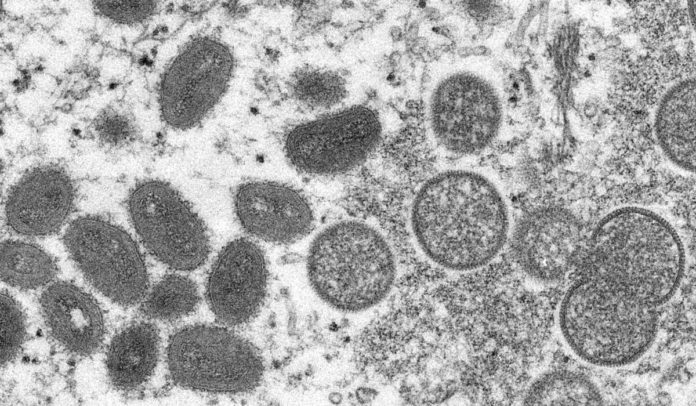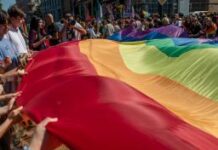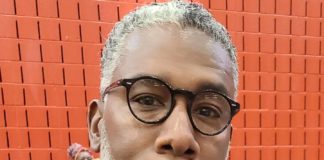
The Biden administration and local leaders are walking a fine line as they play catchup with the surging monkeypox, scrambling to get vaccines and tests to an LBGTQ community that is losing patience while combatting the idea this is a sexually transmitted disease for gay men.
Mounting cases and difficulty in accessing vaccines have led to frustration among advocates who fear the government isn’t doing enough to stem monkeypox, which has little history in countries outside of Africa and features a painful rash.
Comparisons to the early response to HIV/AIDS, which was marked by stigma and early failures, are hard to ignore.
“We, at the Los Angeles LGBT Center, are fearful that the government’s history of not taking the necessary action to protect the LGBT community when facing a public health threat is repeating itself with the current monkeypox response,” Joe Hollendoner, CEO of the center, said recently in an open letter to Rochelle Walensky, the director of the Centers for Disease Control and Prevention.
Dr. Walensky said her team has done “listening sessions” with the LBGTQ community, given the concentration of cases, and recommended vaccines for men with have sex with men in certain scenarios. At the same time, the administration and officials at the World Health Organization have been careful to note it is not a “gay disease” and could spread more generally within populations.
Capt. Jennifer McQuiston, deputy director of the CDC’s Division of High Consequence Pathogens and Pathology, on Friday said over 90% of infected persons in the U.S. identified as gay, bisexual or other men who have sex with men. However, she said it might not stay that way.
“I think we’ve messaged from the start there could be cases that occur outside those networks,” she said.
The CDC revealed Friday that two children, a toddler and an infant, tested positive and the cases are linked to likely household transmission from the community of men who have sex with men.
The comments reflect the balance policymakers must strike in getting resources to gay men, who account for the lion’s share of cases, while emphasizing that everyone is at risk to avoid stigma or messages that could alienate the persons they are trying to help.
“Two things can be true at the same time,” said Kenneth Mayer, the medical research director of Fenway Health and a professor of medicine at Harvard Medical School.
He said it can be a hard point to deliver, since the public isn’t always receptive to nuanced public health messaging.
D.C. Mayor Muriel Bowser said the city is reaching out to the LBGTQ community and “specifically gay and bisexual men because those are the communities most affected by the virus at this moment.”
At the same event, D.C. Health Director LaQuandra S. Nesbitt stressed, “while the majority of the cases are occurring in individuals who identify as members of the LGBTQ+ community, this is not a disease of the LGBTQ+ community.”
“Anyone can contract monkeypox and it is important that we do not create stigma at this time and that we encourage individuals to be on the lookout for symptoms,” she said.
Monkeypox is not classified as a sexually transmitted infection, though some advocates fear it is being treated as one. There are non-intimate ways the virus could spread, including the potential for transmission in prison or gym settings from mutual contact to bedding or towels.
Monkeypox is also set apart from HIV in a technical manner, in that one of the most efficient means of transmission for that disease is anal intercourse, which by definition might increase the risk to gay men.
Monkeypox is spread through more of a network phenomenon.
“There’s not any one behavior that puts them individually at risk for behavior,” Dr. Mayer said. “Because the virus has gotten into social networks, people who have more partners within those networks are more likely to encounter monkeypox.”
The New York City Health Department says almost all of its cases are among men who have sex with men. But Commissioner Ashwin Vasan made it clear he won’t single out the LBGTQ community or tell them what to do.
“Men who have sex with men and the LGBT community writ large have had their sexual practices and behaviors dissected and prescribed and permitted mostly by heterosexual people and policymakers who are heterosexual for decades. And we have found, over years, especially coming out of the HIV movement, is really damaging and stigmatizing and discriminatory,” Dr. Vasan told CNN this week. “Abstinence as a message doesn’t really work. We know this, it’s not a good public health tool because it’s really about giving people the information to make good choices.”
Monkeypox is a virus that’s related to smallpox and features a rash with painful lesions. A small percentage of cases are fatal, though the CDC hasn’t reported any deaths in the U.S. since cases started to appear in mid-spring.
The White House has detailed plans to test for the disease at major commercial labs. The case count is proliferating as clinicians detect more cases, reaching over 2,500. Nearly a third of the cases are from New York.
The administration is also distributing the Jynneos vaccine that is approved for monkeypox, though supplies are being snapped up fast and New York City had to apologize for hiccups in its signup process.
Senate Health Committee Chair Patty Murray of Washington state, a Democratic ally of the White House, told Health and Human Services Secretary Xavier Becerra she is “concerned” with the state of the response and requested a briefing. She wants to know if HHS is applying lessons it learned from the COVID-19 crisis amid reports of confusion and trickle-down burdens that could hamstring other services for the LBGTQ community.
“Various reports indicate challenges at the local level, with some patients and providers stating they do not have the information and resources necessary to understand, test for, or respond to the disease, which is now presenting with uncharacteristic features,” Mrs. Murray wrote to Mr. Becerra. “Since the disease spreads through close, intimate contact, some patients are seeking care at sexual health clinics, which are frequently under-resourced despite providing critical services to underserved communities, including the LGBTQ+ community.”
Her missive followed a similar letter from Rep. Carolyn Maloney, chair of the House Oversight Committee and a New York Democrat whose district has been hit hard by monkeypox.
“The federal government must take decisive action to mitigate the threat monkeypox poses to people across the United States. In my own district, I have seen how the spread has threatened the health of my constituents — particularly the LGBTQ+ community and people with less access to health care,” she told Mr. Becerra.
Advocates said the administration needs to speed up the distribution of vaccines and testing while being mindful of what they say.
“This disease is not an STI, nor does not know your race, gender identity, or sexuality. When communicating, officials must do a better job of taking into account their potential for unintended harm and stigma,” said Cameron Bartosiewicz, president of the Youth Pride Association, a nonprofit that fosters acceptance of LBGTQ persons in schools. “There needs to be significant improvements in communicating the way monkeypox is spread, as well as the risk posed to all Americans if there is not immediate and decisive action taken to curb the spread of this disease.”
• Matt Delaney contributed to this report.








